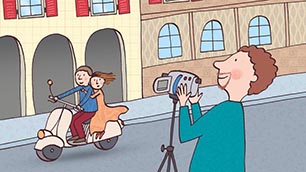I. The Verb Avere
The Italian verb avere means to have. In the following table you can see how it is conjugated for each person in the present indicative.
| io ho | noi abbiamo | |
| tu hai | voi avete | |
| lui/lei/Lei ha | loro hanno |
| Ho tre cose da fare oggi. | I have three things to do today. | |
| Hanno due gatti a casa. | They have two cats at home. | |
| Abbiamo una visione unica. | We have a unique vision. |
II. Idiomatic Expressions with avere
The verb avere is used in many idiomatic Italian expressions. Often it is used where, in English, we would use the verb to be. Have a look at the following list of expressions.
| avere ... anni | to be ... years old | |
| avere bisogno di | to need | |
| avere caldo | to be warm/hot | |
| avere freddo | to be cold | |
| avere fretta | to be in a hurry | |
| avere paura | to be afraid | |
| avere sete | to be thirsty | |
| avere sonno | to be sleepy | |
| avere voglia di | to feel like/to want | |
| avere ragione | to be correct | |
| avere torto | to be wrong |
| Silvia ha paura del cane. | Silvia is afraid of the dog. | |
| Dammi un po’ d’acqua! Ho sete! | Give me a bit of water! I’m thirsty! | |
| Sono le 11 e abbiamo sonno. | It’s 11 and we’re sleepy. | |
| Ragazzi, avete bisogno di aiuto? | Guys, do you need help? |
III. Ce l’ho and Ce li ho/Ce le ho
In Italian the expression ce l’ho (along with its plural form ce li ho and ce le ho) is frequently used; in fact, you’ll hear it all the time! This expression means I’ve got it (or I’ve got them when referring to more than one item).
Take a look at the following exchanges between two people.
| A: Hai il libro? B: Sì, ce l’ho. | A: Do you have the book? B: Yes, I’ve got it. | |
| A: Hai la patente? B: Sì, ce l’ho. | A: Do you have your driver’s licence? B: Yes, I’ve got it. | |
| A: Hai i pattini da ghiaccio? B: Sì, ce li ho. | A: Do you have your ice skates? B: Yes, I’ve got them. | |
| A: Hai le matite? B: Sì, ce le ho. | A: Do you have the pencils? B: Yes, I’ve got them. |
IV. Dov’è
In a previous Act, we saw the word dove, which means where. We also saw the verb essere and learned the conjugation è (he/she/it is). To ask where is [something], we need to combine these two words.
| dove + è = dov’è |
| dov’è → where is |
| dove → where |
Examples:
| Dov’è la pizzeria? | Where is the pizzeria? | |
| Dov’è Maria? | Where is Maria? | |
| Dove vivi? | Where do you live? |





















